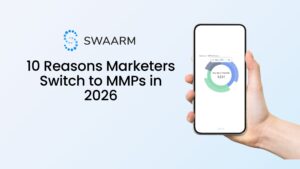Today, smartphones have become an indispensable part of modern life. For most people, the devices are the first thing they see in the morning and the last at night. According to research, people touch their smartphones on average over 2600 times daily. As such, companies that know how to market their apps effectively are at a massive advantage. What’s more, mobile attribution platforms, aka mobile marketing partners (MMPs), can greatly assist this process, helping mobile marketers make informed decisions by showing them which of their strategies are working – and which aren’t.
In this blog, we will explore the world of mobile attribution platforms and their role in mobile marketing. By the end, you’ll also understand the most efficient means of integrating them into your marketing mix.
What is a mobile attribution platform or MMP, and why is choosing the right one so important?
Photo by Jason Goodman on Unsplash
Mobile Measurement Partners (MMPs) play a central role in mobile marketing. In a nutshell, their job is to manage and protect data that can enable mobile apps to track and optimize performance, user engagement, and ad campaigns.
In essence, mobile attribution platforms act as data custodians, and their primary function is to give clients insight into the performance of app advertising campaigns. They offer a comprehensive range of services to monitor the entire user experience within mobile apps, tracking and analyzing each step of the customer journey.
MMPs are the analytical brains behind mobile marketing campaigns. Their expertise lies in understanding user behavior within mobile apps, which they achieve through software development kits (SDKs), tracking pixels, and application programming interfaces (APIs). When an app user interacts with a mobile ad, the mobile measurement platform’s SDK, integrated with the app, records vital data points. These metrics include timestamps, user device information, ad sources, and specific actions like mobile app installation or purchase.
One of the core functions of mobile attribution platforms is event tracking. It allows them to record and monitor user interactions in mobile apps, and covers various events, including ad clicks, impressions, installs, and in–app actions. The granularity, or “detail level,” of event tracking gives businesses insights into user engagement and behavior.
MMPs also use attribution models to assign ad-driven actions to specific marketing touchpoints. These models include probabilistic attribution, multi–touch attribution, and last–click attribution. Accurate attribution can empower app marketers to assess the effectiveness of their various marketing efforts and make data-driven decisions.
Now that we understand how mobile attribution platforms can benefit marketers, we will discuss the best practices app marketers can employ when integrating an MMP.
Best practices when integrating with a mobile attribution platform
Photo by Courtney Clayton on Unsplash
1. Set clear goals
Mobile marketing campaigns benefit any business wishing to reach customers using mobile devices. However, having clear and well-defined objectives is the key to a successful mobile marketing campaign.
Before integrating an MMP into your mobile marketing strategy, you should have a clear picture of your goals. Start by defining the key performance indicators (KPIs) you want to measure. This clarity will guide the integration process, ensuring the MMP is set up to capture and analyze the metrics (e.g., app installs, user engagement, and revenue generation) that matter most to your campaign success.
Defining your objectives at the outset will enable you to set benchmarks and analyze your campaign’s overall performance. It will help you make informed decisions, adjust your strategy where necessary, and ultimately achieve your desired outcomes.
2. Implementing accurate tracking
When making informed decisions concerning mobile marketing strategies, tracking is one of the most valuable tools at your disposal. Mobile measurement partners (MMP) are indispensable for capturing and interpreting relevant data points as they give you the ability to understand user behavior, identify trends, and assess your campaign’s effectiveness. Working closely with an MMP to establish tracking mechanisms that align with your campaign’s objectives is naturally an unavoidable part of mobile marketing.
Nevertheless, make sure you pick the right one. An MMP should offer more than just tracking impressions and clicks but installs and post–install events too. Indeed, the data collected through tracking forms the backbone of your campaign’s analysis and optimization, so comprehensive data is necessary.
Without accurate tracking, your ability to make data–driven decisions will be highly impeded, like driving in the dark without headlights. Instead, ensure that the tracking data your mobile attribution platform provides is detailed and that the data they offer is accurate. Through this, your mobile marketing campaigns will achieve the best results possible.
To this extent, ensuring that the mobile app is seamlessly integrated with your MMP is equally essential for accurate data tracking. Work closely with your development team to implement the MMP’s software development kit (SDK) to achieve this. Following this, verify that all relevant events, such as installs, in-app purchases, and specific user actions, are properly instrumented. The more precise the integration, the more reliable and actionable your data will be.
3. Analyzing and interpreting data
Mobile marketing requires thorough data analysis to fortify your business with a competitive edge. By leveraging accurate and detailed information, you can uncover information that can guide your strategy and drive results.
And in this regard, mobile attribution platforms are priceless. Offering a wealth of data on user demographics, geographic locations, and device types, among other valuable metrics, they can offer an overview of your campaign’s performance in real-time. By analyzing this information, you can identify areas of success and areas for improvement while gaining a deeper understanding of user behavior and preferences.
Mobile attribution platforms provide tools and reports to dissect the information you gather. It’s necessary to take actionable steps based on your data analysis to optimize your campaigns and maximize your return on investment (ROI).
In order to both analyze data accurately and implement the results effectively, marketers should spend time exploring the mobile attribution platform’s features and reports. To become an expert in your MMP’s capabilities, read the platform’s knowledge base and watch video tutorials. In this sense, it’s also essential to try before you buy. So before signing up with a platform, ask the MMP provider to arrange a product demo or a clarification session.
By frequently evaluating and refining your approach, you will create enduring growth for your business in the ever–evolving mobile marketing landscape.
Photo by Clique Images on Unsplash
4. Prioritize data privacy and security
In the mobile marketing industry, data protection has become one of the most important topics. As concerns surrounding data privacy and the myriad ways it can be compromised continue to proliferate, mobile marketing businesses must prioritize the security of user information during the integration of mobile measurement partners (MMPs). The MMPs you work with must, by law, now comply with strict data protection regulations, including GDPR (General Data Protection Regulation) and CCPA (California Consumer Privacy Act).
One way of safeguarding user data is by implementing robust encryption protocols. Encryption serves as a digital fortress, protecting sensitive user data from vulnerabilities. By integrating encryption into the MMP framework, a secure environment is established for the storage and transmission of user information.
Beyond regulatory compliance and encryption, the focus on data privacy and security is also concerned with building and maintaining user trust. Today, users are more conscious of how their data is handled. By prioritizing privacy measures from the very moment your MMP integration begins, a mobile marketer will instill confidence in users and mitigate potential legal risks.
In short, a meticulous approach to data privacy and security needs to meet regulatory requirements, foster a relationship of trust with users, and shield mobile marketers from the legal pitfalls associated with mishandling sensitive information. In an era where user data is a precious commodity, working with an MMP that has an unwavering commitment to privacy will simultaneously enhance the credibility of your mobile marketing efforts and cultivate lasting trust with your user base.
5. Regularly audit and optimize
As established, it’s today unthinkable that any entity involved in mobile marketing could refrain from using a mobile measurement partner (MMP). And, as also discussed, it would be similarly inconceivable for any such business to overlook the necessary responsibility of auditing and optimizing the tracking process that comes with it. Yet, rather than treating MMP integration as a one-time task, it’s, in fact, better to approach it as an ongoing process. Doing so will ensure the accuracy and relevance of data tracking, thereby boosting the efficacy of any campaign.
Regular audits serve as a compass, guiding your integration to align with the dynamic landscape of mobile marketing. Periodic reviews are imperative to identify and rectify any discrepancies that may arise, guaranteeing the data’s reliability. These audits also present an opportunity to streamline processes, making your mobile marketing efforts more efficient.
Staying aware of updates and new features from your MMP is just as important. Technological advancements and innovations can unlock new dimensions of insight, as well as a chance to optimize things. By remaining informed, you can empower your mobile marketing strategy with the latest tools, ensuring that your campaigns are at the forefront of industry capabilities.
In mobile marketing, continuous optimization is the key to sustained success. It’s about maintaining the status quo and proactively adapting to the ever-shifting landscape. By regularly optimizing the integration of your MMP, you will give yourself the security of knowing that the data it provides isn’t just a snapshot of today but a dynamic and responsive tool that evolves in tandem with the demands and opportunities of the mobile marketing ecosystem. Through this iterative cycle of audits and optimizations, mobile marketers can obtain a competitive edge, driving continual improvements and maximizing the impact of their campaigns.
Conclusion
Integrating an MMP is a strategic move towards enhancing your mobile marketing capabilities. Following the five best practices outlined here will lay the foundation for a seamless and effective integration process. These practices not only streamline the integration process but empower you to make well-informed decisions, optimize campaigns, and drive success in the competitive sphere of mobile marketing.
Don’t just manage campaigns; optimize them with Swaarm MMP! Start your journey to data-driven success — Book a demo now!






